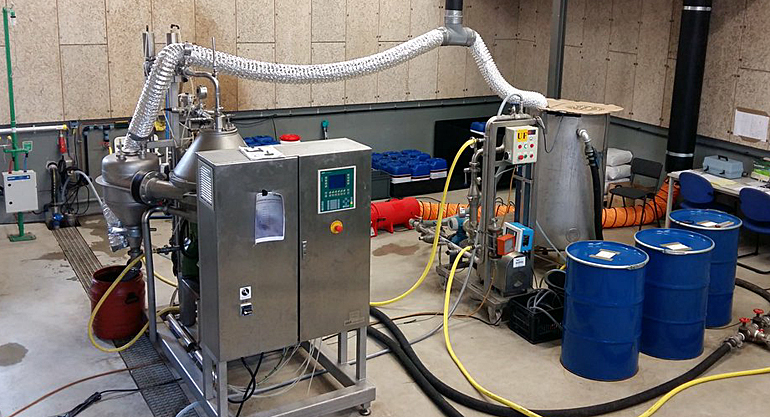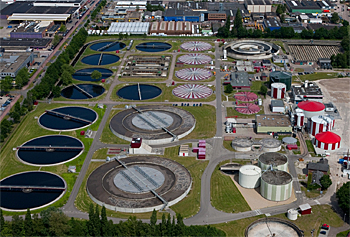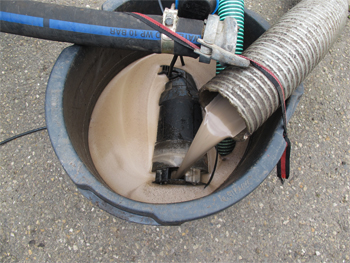Large-scale extraction of Nereda alginate from waste water at wwtp Apeldoorn, the Netherlands
 Regional water authority Vallei and Veluwe is conducting pilot tests for the extraction of Nereda alginate from sludge at its wwtp Apeldoorn, the Netherlands.
Regional water authority Vallei and Veluwe is conducting pilot tests for the extraction of Nereda alginate from sludge at its wwtp Apeldoorn, the Netherlands.
The first tests prove that extraction is possible at large-scale. The results of the trials will be used to build the first two full-scale alginate recovery plants by 2018-2019.
The alginate is recovered from the granule sludge that is generated at a Nereda waste water treatment plant. Nereda alginate is a substance with unique characteristics and potentially high-quality applications, like an adhesive in a fertiliser pellet.
 Contributing to the circular economy, wwtp Apeldoorn delivers biogas for the production of electricity and hot water for a nearby housing area. The plant also recovers 900 ton struvite annually that can be used as an agricultural fertilizer.
Contributing to the circular economy, wwtp Apeldoorn delivers biogas for the production of electricity and hot water for a nearby housing area. The plant also recovers 900 ton struvite annually that can be used as an agricultural fertilizer.
Retain and repel water
Another characteristic of Nereda alginate is that it can both be used as a product to retain water but also to repel water. This means it can be widely used – for example, in the horticulture and the paper and concrete industries.
It can be used as a thickening agent or an adhesive, as a coating or as a stabiliser. Reportedly, various market parties have already shown interest in using the alginate – as a concrete coating, for example.
Adaptation of regulations on waste
In order to be able to bring Nereda alginate on the market, the existing regulations on waste have to be adjusted. Director Tanja Klip-Martin at Vallei and Veluwe: “I believe that the status of extracted raw materials should be made equivalent to that of primary raw materials. On condition there are no risks to public health when they’re deployed, because we don’t want to throw out the baby with the bathwater.”
Klip-Martin: “It is only then that we will have an equal playing field and that the Government’s aim to make the Netherlands circular by 2050 will become realistic.”
 Alternative for extraction from seaweed
Alternative for extraction from seaweed
At the moment, alginate is extracted from seaweed. That is currently being done in Asia. It is a relatively expensive process. Because of this, the use of this type of alginate is mostly limited to the medical sector (including moulds for false teeth, alginate plasters).
The alginate in the sludge pellets left behind after treating wastewater with a Nereda installation is more sustainable, more economical and therefore more broadly deployable on the market.
National development programme
The extraction of Nereda alginate from wastewater is part of the NAOP National Alginate Development Programme.
In this programme, the Dutch Water Authorities cooperate with the Foundation for Applied Water Research (STOWA), engineering firm RoyalHaskoningDHV and Delft University of Technology.
Read also on this website
● World’s first Verdygo modular sewage treatment plant put into use at wwtp Simpelveld, the Netherlands, 20 December 2016
● Weftec 2016: Royal HaskoningDHV teams up with new US partners on Nereda waste water technology, 28 September 2016
● Water board Vallei-Veluwe opens state-of-the-art recovery facilities at wwtp Apeldoorn, the Netherlands, 8 July 2015
More information
RoyalHaskoningDHV
Amersfoort, the Netherlands
+31 88 348 20 00
www.rhdhv.com
Waterboard Vallei-Veluwe
Apeldoorn, the Netherlands
+31 55 527 2911
www.vallei-veluwe.nl
Energy factory programme
info@energiefabriek.com
www.efgf.nl/english
Nereda waste water treatment - How does it work?



